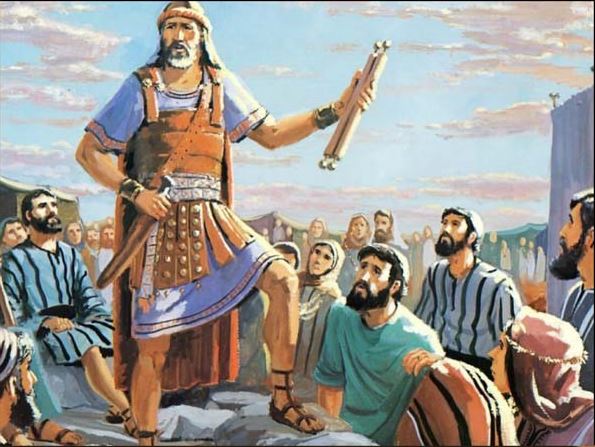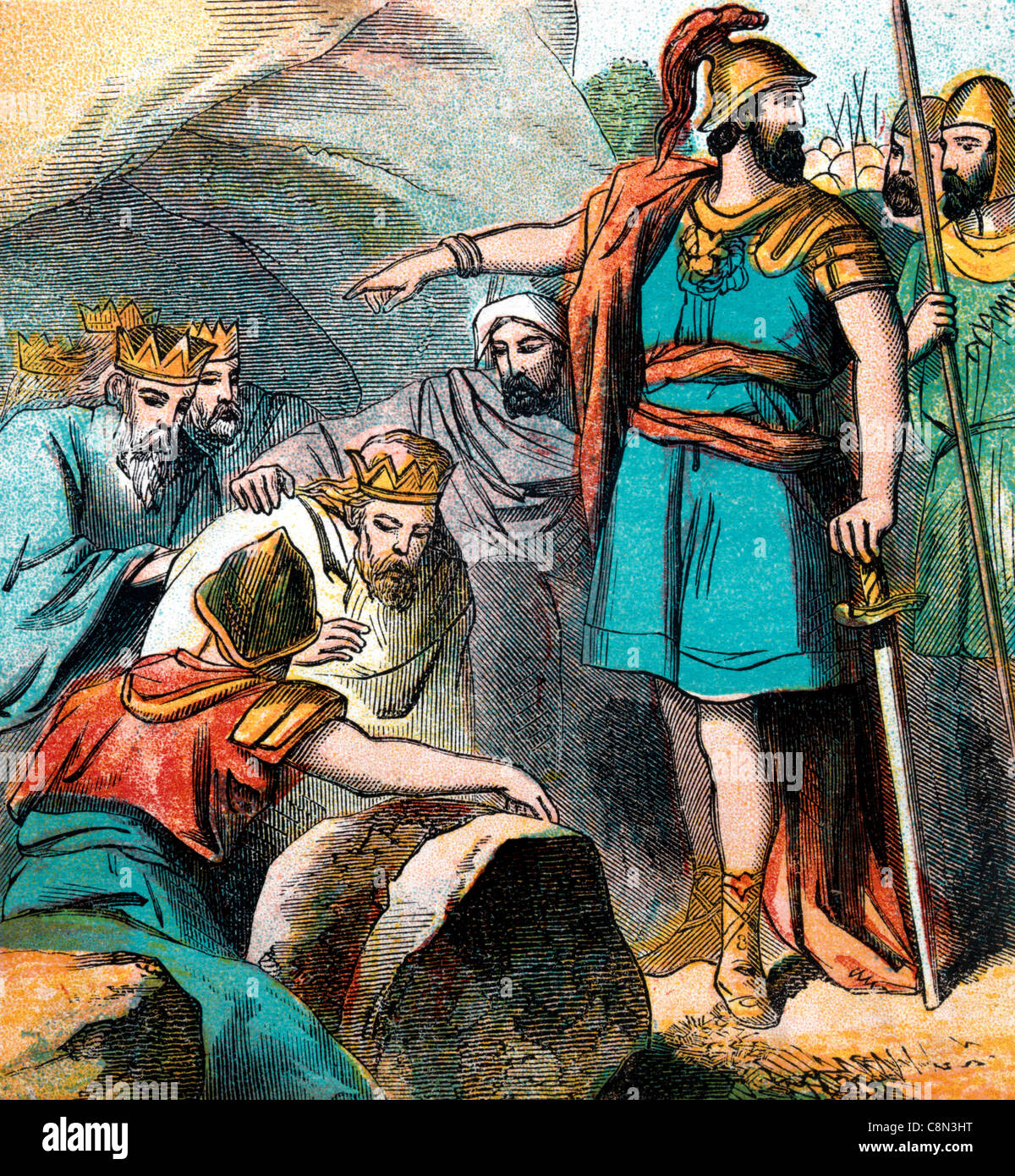Many folks, you know, often find themselves curious about public figures, and it's almost natural to look up details about their family members, like a famous actor's daughter. So, it's pretty common for searches to pop up for things like "Joshua Morrow daughter," as people try to connect with the lives of those they see on screen. Yet, sometimes, these kinds of inquiries can lead to a bit of a fascinating detour, bringing us to other significant figures who share a well-known name, even if they're from a completely different time and place.
In a way, while the search might begin with a modern personality, it can actually open up a window into a much older, profoundly impactful story. This happens quite a lot, where a simple search term acts like a key, unlocking a narrative that's been around for a very long time, shaping beliefs and inspiring people for centuries. It's really quite interesting how one name can resonate across such different contexts, isn't it?
So, as a matter of fact, today, we're going to put a slightly different spin on that familiar name. We'll be looking at a Joshua whose story is deeply rooted in ancient history and sacred texts, a figure whose life offers a wealth of lessons and insights. This particular Joshua, you see, played a truly pivotal part in a historical journey, one that continues to influence countless individuals today. We'll explore his beginnings, his rise to prominence, and the profound impact he had on his people, drawing from historical accounts that paint a vivid picture of his enduring importance.
- Kaitlyn Krems Bra Size
- What Do Customers Say About The Taste Of Pillsburys Halloween Cookies
- Euros Simbol
- Chinese Zodiac 2003 Animal And Element
- Why Does Carmex Burn My Lips
Table of Contents
- Who Was This Joshua, Really?
- How Did Joshua's Early Life Shape Him?
- What Made Joshua a True Leader?
- What Challenges Did Joshua Face as a Leader?
- Was Joshua a Figure of Grace or Judgment?
- What Can We Learn From Joshua's Faith?
- How Does Joshua's Story Connect to Broader Themes?
- Joshua's Lasting Influence and Significance
Who Was This Joshua, Really?
When people hear the name Joshua, their thoughts often turn to different individuals, but for many, especially those familiar with ancient texts, a very specific person comes to mind: Joshua, the son of Nun. He's a truly key person in the Hebrew Bible, someone whose life story is, you know, pretty much central to a big part of Israel's early days. His birth name was Hoshea, which means "salvation," but Moses, his mentor, later gave him the name Joshua, meaning "Yahweh is salvation" or "the Lord saves." This renaming, in some respects, seems to foreshadow the immense role he would play in the history of his people, acting as a guide to a new future.
Basically, this Joshua was Moses's right-hand person, a close helper who was always there, learning and assisting. He's often referred to as Jehoshua or Josue in various accounts, but the core identity remains the same. His path, you see, was set from a very early age, even though he began his life in pretty tough circumstances. He wasn't born into privilege or power; quite the opposite, actually. His journey is a powerful reminder that where you start doesn't always dictate where you'll end up, especially when there's a strong sense of purpose guiding you, which is that.
Joshua Morrow Daughter - A Look at His Personal Details and Bio Data from Ancient Texts
While the initial query might be about "Joshua Morrow daughter," the historical records we're drawing from tell us about a different Joshua. So, based on the provided ancient texts, here's a summary of what we know about the biblical Joshua's personal details and early life, though, of course, a table of "bio data" in the modern sense isn't quite applicable to a figure from so long ago. Still, we can pull out some interesting facts about this important character.
- Unclefester
- Chase Mortgage Pre Approval
- Does Vicks Rub Expire
- James Spader Heart Attack
- Elon Musk Childrens Names
- Original Name: Hoshea
- Renamed By: Moses
- New Name Meaning: "Yahweh is salvation" or "the Lord saves"
- Father's Name: Nun
- Early Life Circumstance: Born into bondage in Egypt, lived as an unfree laborer under harsh Egyptian overseers.
- Relationship with Moses: Assistant, devoted student, aide, and eventually, his chosen successor.
- Primary Role: Leader of the Israelites after Moses's passing, responsible for their taking over of Canaan.
- Key Qualities Described: Devoted student, pious person, clever battle leader, strong, unwavering faith.
- Main Historical Source: The Book of Joshua in the Old Testament.
This information, you know, paints a picture of a person who overcame significant challenges from the very beginning. His story, in a way, is one of transformation and perseverance, which is really quite inspiring. It's clear that his background, even though it was difficult, helped to shape the powerful figure he would become later on.
How Did Joshua's Early Life Shape Him?
It's interesting to consider how a person's earliest experiences can truly mold who they become. For Joshua, his beginning in Egypt as a person held in bondage, under the unkind oversight of Egyptian foremen, was, you know, a pretty stark reality. This was a life filled with hardship, with constant demands and little freedom. Yet, it was from these very difficult circumstances that he started to rise, which is that. His experiences during this period, you could say, probably instilled in him a deep understanding of suffering and a strong desire for freedom and justice for his people. It's almost as if the trials he faced early on became the very groundwork for his later strength.
He wasn't just a bystander during the big events of the departure from Egypt; he was, in fact, a very active participant. The text tells us he was a major figure in these happenings, someone who was right there as things unfolded. Moses, his mentor, actually gave him the important duty of picking and directing a citizen army for their initial conflict after leaving the land of Egypt, against the Amalekites. This was a pretty big responsibility for someone who had just come out of bondage, and it shows the early trust and confidence placed in his abilities. This early exposure to leadership and conflict, you know, must have been a vital part of his preparation for the immense tasks that lay ahead, truly.
What Made Joshua a True Leader?
Joshua’s journey from being an unfree laborer to becoming one of the most important figures of Israel is, frankly, a remarkable tale of growth and unwavering commitment. The texts describe him as a person of steady belief, someone who followed the divine with deep loyalty. This devoted adherence to the Creator was, you know, a core element of his character and, basically, the driving force behind his ability to lead. It wasn't just about military skill or strategic thinking; it was about a profound connection to something larger than himself, which is that.
He's often presented as a devoted student, someone who was always learning and absorbing wisdom, especially from Moses. This dedication to learning, coupled with his pious nature, made him a well-rounded person, not just a warrior. He was, apparently, also a clever battle leader, possessing the kind of tactical mind needed to guide a whole group of people through challenging times. His ability to inspire and direct, to maintain morale and focus, even when facing significant obstacles, truly set him apart. It's quite clear that his leadership was a blend of spiritual grounding, intellectual curiosity, and practical skill, which is that.
What Challenges Did Joshua Face as a Leader?
Taking over from a figure as monumental as Moses was, you know, an incredibly tough act to follow. Moses had led the Israelites out of bondage, communicated directly with the divine, and given them their foundational laws. So, Joshua's first big challenge was stepping into those very large shoes after Moses, the helper of the Most High, had passed away. The Lord himself, as a matter of fact, told Joshua, Moses’s aide, that his servant Moses was gone, and it was now Joshua’s turn to guide the people of Israel into the promised land of Canaan. This was a truly enormous task, a promise of a new home but one that required immense courage and determination to achieve.
The primary hurdle was, of course, the actual taking over of Canaan. This wasn't going to be a simple stroll; it involved confronting and gaining control over many groups already living there, some of whom were quite powerful. Joshua had to lead his people through numerous conflicts, making strategic decisions that would determine their very survival and future. He was responsible for distributing the lands to the twelve tribes, a task that required fairness and wisdom to prevent internal disputes. These were not just physical challenges, but also moral and spiritual ones, requiring constant guidance and a firm hand. It was, basically, a period of constant testing for his leadership, really.
Was Joshua a Figure of Grace or Judgment?
One of the more thought-provoking aspects of Joshua's story is how he seems to embody two seemingly different roles: a bringer of kindness and a channel for condemnation. The texts suggest he was an agent both of favor, like in the interesting situation with Rahab, and of ruin in the sacred conflict of Yahweh against the seven unjust peoples in the promised land. This dual nature is, you know, pretty complex and gives us a lot to think about. It shows that his role wasn't always straightforward or easy to categorize, which is that.
In the situation of Rahab, for example, Joshua extended a kind of mercy, offering protection to someone who, by conventional standards, might have been seen as an outsider or even an enemy. This act of grace demonstrates a capacity for compassion and a willingness to see beyond immediate circumstances. Yet, at the same time, he was also the one tasked with carrying out divine judgment against the groups living in Canaan, which involved very harsh actions. This aspect of his work highlights a different side of his mission, one that involved strict adherence to divine commands, even when those commands were incredibly difficult. It's almost as if he was a tool for both construction and deconstruction, building up one future while dismantling another, truly.
What Can We Learn From Joshua's Faith?
Joshua's story, you know, really brings attention to his lasting impact of inner power, guidance, and steady belief. From his beginnings as a new fighter to leading a whole group of people into a new land, his life is a powerful illustration of what unwavering faith can achieve. It wasn't a fleeting or uncertain belief; it was, apparently, a deep-seated trust in the divine that guided his every step. This kind of firm conviction is, in some respects, pretty rare and truly inspiring to witness in any historical account.
His loyalty to the divine was, basically, the bedrock of his success. The texts repeatedly show him as someone who faithfully followed commands, even when they seemed illogical or incredibly challenging. This loyal devotion to the Creator wasn't just a personal trait; it was a public example for all the Israelites. He showed them, through his own actions, what it meant to truly rely on a higher power, which is that. His ability to maintain this firm trust, even when faced with overwhelming odds or moments of doubt, is perhaps one of the most significant lessons his story offers. It suggests that genuine belief isn't about avoiding difficulties, but about facing them with a persistent reliance on something greater than oneself, really.
How Does Joshua's Story Connect to Broader Themes?
It's interesting to consider how Joshua's life, in a way, echoes larger, more expansive ideas that resonate throughout history and belief systems. Whatever the Israelites received in the promised land, they received through the hand of Joshua. He was the one who, you know, literally brought them into their inheritance, making the divine promise a tangible reality for them. This role as a bringer of fulfillment is, in some respects, a pretty profound one, and it's something that many spiritual traditions explore.
The texts actually draw a connection between Joshua and a later, even more central figure: Jesus Christ. It's often suggested that whatever believers receive from the divine in the fresh agreement, they receive through Jesus Christ, our Joshua. This comparison, you know, highlights a pattern of leadership and deliverance. Just as Joshua was both a channel for favor and, at times, for ruin in the sacred conflict of Yahweh against the unjust peoples, Jesus is presented as both a rescuer and, in some interpretations, a figure of judgment. This parallel suggests a continuous thread of divine interaction with humanity, where figures are chosen to guide, protect, and bring about significant changes, which is that. It's a way of seeing the past as a kind of foreshadowing for future events, offering deeper layers of meaning to the narratives.
Joshua's Lasting Influence and Significance
Joshua's story, you know, continues to hold a truly important place in many traditions. His journey, from a person held in bondage to a powerful guide of his people, serves as a timeless account of perseverance, belief, and the impact of devoted adherence. He wasn't just a military chief; he was a spiritual leader, a teacher, and a living example of what it means to follow a path with conviction. His legacy, basically, extends far beyond the historical events he participated in, reaching into the very core of what it means to lead with purpose and faith, which is that.
The Book of Joshua, his primary historical source, is the sixth book of the Bible, and it tells his story in considerable detail. This document, you see, ensures that his actions, his challenges, and his triumphs are remembered and studied by generations. It's a rich source of lessons about courage, about facing new beginnings, and about the responsibilities that come with guiding a group towards a shared future. His influence, in a way, is still very much felt today, as people continue to draw inspiration from his experiences and the profound impact he had on his people's destiny, truly.
Related Resources:



Detail Author:
- Name : Otis Sanford
- Username : lucious06
- Email : ltromp@haag.com
- Birthdate : 2002-08-12
- Address : 25989 Gibson Vista South Lloyd, OK 07081-3381
- Phone : 564-716-9009
- Company : Price-O'Reilly
- Job : Wellhead Pumper
- Bio : Rerum omnis cum sed vero repellat voluptas impedit. Aut fuga saepe perspiciatis totam eveniet. Voluptate repellat est aut ex dicta.
Socials
facebook:
- url : https://facebook.com/tierra_goyette
- username : tierra_goyette
- bio : Quam non aut tempora porro. Et doloribus repellendus veniam non omnis.
- followers : 1671
- following : 1192
instagram:
- url : https://instagram.com/tierra.goyette
- username : tierra.goyette
- bio : Laborum voluptatibus possimus a esse et. Animi in odit ab. Qui sed qui odit aliquid omnis ea vitae.
- followers : 1070
- following : 2273